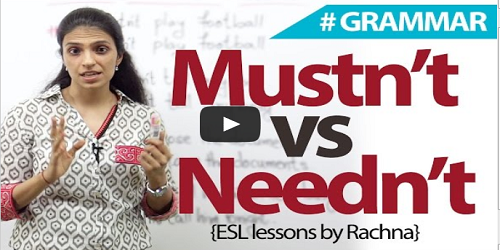How To Use ‘mustn't’ and ‘needn't’ correctly in English
In this lesson, we are going to learn the difference between the two
modal verbs, mustn’t and needn’t. They both have completely different
meanings and can’t be used interchangeably.
Mustn’t is used to say something is not allowed or something is prohibited. When you want to say it is necessary that you do not do something, then use mustn’t.
• Example: You mustn’t play football. (prohibited from playing)
• Example: You mustn’t tell anybody. (not allowed to tell)
• Example: You mustn’t lose the document. (it is necessary that you do not lose)
• Example: You mustn’t call him when he is busy. (it is necessary you do not disturb him
Needn’t is very different from mustn’t. It is used to say that you do not have to do something, it is not necessary to do something.
• Example: You needn’t play football. (you don’t have to play)
• Example: You needn’t tell anybody. (it is not necessary to tell, but if you do, it is ok)
• Example: You needn’t carry the documents. (you don’t have to carry)
• Example: You needn’t call him tonight. (you don’t have to, but if you do call, it’s absolutely ok)
Mustn’t is used to say something is not allowed or something is prohibited. When you want to say it is necessary that you do not do something, then use mustn’t.
• Example: You mustn’t play football. (prohibited from playing)
• Example: You mustn’t tell anybody. (not allowed to tell)
• Example: You mustn’t lose the document. (it is necessary that you do not lose)
• Example: You mustn’t call him when he is busy. (it is necessary you do not disturb him
Needn’t is very different from mustn’t. It is used to say that you do not have to do something, it is not necessary to do something.
• Example: You needn’t play football. (you don’t have to play)
• Example: You needn’t tell anybody. (it is not necessary to tell, but if you do, it is ok)
• Example: You needn’t carry the documents. (you don’t have to carry)
• Example: You needn’t call him tonight. (you don’t have to, but if you do call, it’s absolutely ok)
Like Us On Facebook For Daily FREE English Learning Tutorials

Comments
Post a Comment